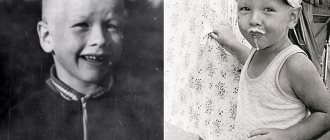Biography of Gleb Panfilov
Gleb Anatolyevich Panfilov - one of the greatest masters of domestic and world cinema, People's Artist of the RSFSR, honorary doctor of the St. Petersburg University of Film and Television, academician, laureate of the State Prize and the Presidential Prize of the Russian Federation, holder of the Order of Merit for the Fatherland, IV degree, French officer Order of Arts and Letters.
In the photo: Gleb Panfilov
The author of the brightest films is the winner of many national and international film awards, including a special jury prize at the Cannes festival for outstanding artistic achievements in the drama “Mother”, the “Golden Leopard” award at the Locarno festival (Switzerland) for the war film “No Ford in Fire”, “ Golden Bear" from Berlin for the romantic film "Theme", a diploma at the IFF in New York and the Venetian "Silver Lion of St. Mark" for the tragicomedy "The Beginning".
Biography
Gleb Anatolyevich Panfilov is a director who came to cinema from a scientific background. His first film brought him recognition from his colleagues and an award at an international film festival, and less than 20 years after filming his debut film, Panfilov became People’s Artist of the RSFSR.
Director Gleb Panfilov
The director's films are mercilessly truthful and epic, at the same time permeated with subtle psychologism and lyricism. After the release of Panfilov’s first works, film critics put him on a par with his star colleagues Andrei Konchalovsky, Larisa Shepitko and Elem Klimov.
Childhood
The future famous director was born on May 21, 1934. His parents, Anatoly Petrovich and Vera Stepanovna, lived in a barracks and built a metallurgical plant in Magnitogorsk. My father, a convinced communist with a strong character, came from a family of blacksmiths, was a journalist, during the Second World War he was the editor of a front-line newspaper, then he taught party history at the VTU named after. B. Shchukina. Mother had an economic education. Later, the couple had a son, Evgeniy (who died in 2012 at the age of 75) and Maxim (who became a film director, actor and producer).
Gleb Panfilov in his youth
According to Gleb Anatolyevich, as a child he was greatly impressed by his first visit to the Theater of Young Spectators, where his grandmother took him, a six-year-old boy, - it awakened his imagination.
But his main shock in those years was the moment of developing the image on photographic paper, when his father allowed his son to watch how photographs were printed in a dark room with red light and bowls of chemical reagents. This, at first glance, insignificant incident played a significant role in his life - it led him to chemistry and cinema.
SOCIAL AND POLITICAL NEWSPAPER OF THE TANENETS AUTONOMOUS DISTRICT
From the approving roar of the audience, it became clear that the candidate’s proposals immediately gained their supporters.
At the debate of participants in the preliminary voting of “United Russia” on by-elections to the Assembly of Deputies of the Nenets Autonomous Okrug, it was difficult not to pay attention to this young man: he behaves calmly, speaks without a piece of paper, and at the same time he does not present the usual beautiful phrases, but offers interesting ideas and immediately briefly explains the mechanism their implementation.
So, meet Anatoly Panfilov. Born on February 14, 1985 in Naryan-Mar. He studied at Naryanmar secondary school No. 2. Then he entered the Voronezh Military Aviation Engineering University, from which he graduated with honors. Then military service, successful work in management positions in gas and oil companies in Yamal.
In 2012, State Duma deputy Grigory Ledkov noticed an active fellow countryman and invited him to work as his assistant in the Yamalo-Nenets Autonomous Okrug.
Today Anatoly Panfilov is an assistant to a State Duma deputy and an employee of the staff of the governor of the Yamal-Nenets Autonomous Okrug.
Anatoly's parents live and work in Naryan-Mar.
Corr.: Anatoly Alexandrovich, you are young, successful, went through a good industrial school and are returning to Naryan-Mar. What caused this decision?
A. Panfilov: – The question of returning to the district, to our small homeland, has been around for a very long time. Of course, there were thoughts, but as a result, the answer to this question turned out to be simple and obvious. All the years of my work in Yamal and the Tyumen region, I constantly observe how the district is developing. And I see many social problems that need to be solved. I am sure that the residents of the Nenets Autonomous Okrug should live no worse than our neighbors. Let's compare the Nenets Autonomous Okrug with the Yamal-Nenets Autonomous Okrug. There are more than half a million residents, and we have only 45 thousand. The territories seem to be identical, but life in our district is more complicated. Social instability, lack of decent work, large outflow of population, hence the shortage of personnel. Young people, for the most part, having studied at universities, do not return back. Because he sees no prospects. We need to reverse this situation, we need to dispel stereotypes and give young people a real opportunity to express themselves. Working in Yamal, I always missed my home and flew to Naryan-Mar as soon as possible. My parents, relatives and friends live here. This is also one of the main factors for returning to the Nenets Autonomous Okrug. So I know first-hand about all the problems that the people of the district face. I consider it my duty to restore people’s faith in their native district, love for their native land and, of course, try to change stereotypes...
– By the way, how can we bring young local specialists back to the district?
– I’m ready to become the first sign. I personally know many natives of our district, accomplished specialists in their field, friends who have achieved success, and they are ready to return to their homeland. Of course, they must have a job and a decent salary.
The most important thing is that they will not abandon the district, they will try to do everything at the highest level. For example, I’ll take the district road enterprise – DRSU, which is going through times of crisis. The roads in Naryan-Mar are in disgusting condition. Every year repair work is carried out, but no one sees any improvement. There is only one way out: there are specialists who can come here to work and really get down to business. It is necessary to develop a program similar to the neighboring district. Introduce a warranty period of 5-7 years for road construction, as in the Yamal-Nenets Autonomous Okrug. So that the company is responsible for the quality of work and bears responsibility. And there is no need to refer to the fact that there is permafrost here. In fact, it is necessary to carry out good survey work and find a competent operating organization. The main thing is that there are such specialists. They are ready to return to the district and work for its benefit. And not just take up bread-and-butter positions.
Also, in my opinion, the program should be adopted for young professionals and yesterday’s students. If the district sends them to study, then they will be required to return to the region and work for 5-7 years, but for this it is necessary to create acceptable conditions for them so that they want to return to their small homeland and work. Of course, at first, provide young specialists with official housing.
– You are 34 years old. You received an excellent education at the university. You already have diplomas as a teacher, an oil worker, and are now getting a degree in law. Are you interested in the process of gaining knowledge or...
– I’ll probably study all my life...Self-education is important for me. Today information and education are the main human capital. I really want the district to have a branch of a worthy multidisciplinary university or several educational institutions, so that residents of the Nenets Autonomous Okrug have the opportunity to get an education here and improve their skills. I am ready not only to promote this idea, but also to bring it to life.
Unfortunately, our secondary specialized education program has failed. There are many specialties in the city vocational school, but sometimes there is no real demand for young personnel. It would be necessary to adopt a strategic program for the employment of graduates of this educational institution. Moreover, we have only one such school in the entire district. And we really need it here. We cannot survive without training people in working specialties. And we need to adopt a strategic program for 5-10 years for those specialties that the district will need for development. In this regard, there is a good example - Sakha (Yakutia).
In general, you should always learn, learn everything new. Since school, I have always studied with a desire, I have always understood what is very important for me and necessary for my future. Life changes rapidly, new opportunities appear, you need to learn all this.
– I want to return to your social work. You are an assistant to State Duma deputy G.P. Ledkov for work in the Yamalo-Nenets District. Tell us more about this work, what pressing issues are being solved for northerners, what kind of assistance is being provided?
– In the activities of a deputy of the Federal Assembly, his powers allow him to work on a wide range of issues, and not only in the Yamal-Nenets Autonomous Okrug. We help residents of the northern regions.
The questions and problems they pose are very diverse. We are trying to solve them. Here I would like to especially note that, unlike our district, in all constituent entities of the Russian Federation the authorities, oil companies and local residents resolve these issues together, and the institution of social partnership operates.
We recently presented a project to address such issues using the example of the Purovsky district, in particular, how GAZPROMNEFT and the NOVATEK Company provide assistance in finding employment for graduates of pedagogical educational institutions and vocational schools. Oil workers took it upon themselves to resolve these issues. For example, people retire and are replaced by the younger generation. Companies place orders with educational institutions for specialists who will be needed in the region in the coming years, and subsequently employ them.
– Tell us about your parents and the lessons you learned from them.
– My parents are working people. Now retired, but continue to work. They are good, decent people. They support me and my younger brother, who lives in Naryan-Mar. I love my family and my loved ones very much. We have many relatives, we maintain good relations with everyone. They also want me to return to the district and apply my knowledge and experience here.
Work and decency are the main things that are valued in our family. I was brought up by the example of my parents and value this. I am proud that I was trained at a military academy. She gave me a start in life. I am on the board of trustees of my academy and provide assistance.
In our people I value sincerity, decency, honesty, and hard work. The most important thing is to never let anyone down or betray anyone. As I already said, I don’t accept people’s inertia. And today we all need to think carefully about who we will elect to the district Assembly, who will defend the interests of the residents of the district, so that people can have a decent life.
– Do you have time for hobbies?
– There are many things I would like to do for my soul. But there is not enough time for everything. If I have a free day, I like to go skiing and skating. I am a prize-winner of the Northern Lights championship, a repeated champion of the armed forces. I love reading, I love theater.
Well, my favorite pastime is exploring and learning. I'm interested in new people. Wherever I am, I am interested in the problems and achievements of the regions, how people live, how those who represent us in power organize their work.
First steps to success
After school, Gleb graduated from the chemistry department of the Ural Polytechnic University in Sverdlovsk (now Yekaterinburg), and was interested in photography. Then he, an aspiring chemical engineer, worked as a foreman in the chemical cleaning department at a local penicillin plant. In 1959, Panfilov moved to the Komsomol city committee to the position of head of the propaganda and agitation department. During the same period, at his suggestion, a city amateur film studio was created, where he shot his early short films.
Young Gleb Panfilov
In 1960-1963, working from 1961 on Sverdlovsk television and continuing to shoot short films, he studied at the correspondence department of the cinematography department of VGIK (workshop of A.D. Golovnya), then, until 1965, he was a student at the Higher Courses for Scriptwriters and Directors (VKSR) .
Inna Churikova and Gleb Panfilov in their youth
He began working as a director in 1966 at the Lenfilm film studio, and two years later the premiere of his debut feature film “There is No Ford in Fire” took place. She told about the fate of Tanya (Inna Churikova), a Komsomol member with an unprepossessing appearance, who worked on a hospital train during the Civil War, met her first love and unexpectedly discovered the talent of a real artist.
Gleb Panfilov: “I am an ardent admirer of my wife”
His films are included in the golden fund of cinema - “There is no ford in fire”, “The Beginning”, “Please speak”, “Mother”, “The Romanovs. Crowned family." But now Panfilov continues to amaze the audience not in the cinema, but in the theater.
“The shop manager was sleeping, and we were working”
Gleb Anatolyevich was born on May 21, 1934 in Magnitogorsk. After school, he graduated from the Ural Polytechnic, where he studied at the Faculty of Chemistry and was a shift engineer at a medical preparations plant, or, in common parlance, a penicillin plant. “We worked in three shifts, six days a week: six days from 8 am to 6 pm, then from 6 pm to 12 am, then from 12 am to 8 am,” Panfilov recalls. “The body was going haywire - there was no system, no rhythm, everything was mixed up, everything was leading to the destruction of health. But the main thing: they worked in the vapor of butyl acetate or chloroform, sometimes the solution spilled and reached the ankles. And so you constantly want to sleep, and if this also happened at night, it’s simply unbearable! The shop manager was sleeping, and we were working.”
In such conditions, Gleb filmed his first film at an amateur studio, which he organized at the factory: he came home, had breakfast and went to filming. It was the painting “Nylon Blouse,” a moralizing story about how a grandmother sent her granddaughter money for the trip so that she would finally come to her, and the girl instead bought a nylon blouse and stayed at home. Panfilov sent his film to the All-Union screening. Subsequently, the very famous film scholar and critic Ramil Sobolev wrote about a strange director who sent his strange film “Nylon Blouse”. This is something, they say, keep an eye on this young man.
The next film, “People's Militia,” was a documentary filmed on the streets of Sverdlovsk. And when the Minister of Culture of the RSFSR watched this film at the Sverdlovsk Film Studio, he said: “You know what, we will release this picture on the wide screen.” And so it happened. And Panfilov became a young filmmaker in a very short time.
At that time, the director’s friendship with actor Anatoly Solonitsyn began. “We met in our young years, in five minutes - and for the rest of our lives,” says Panfilov. – This fateful meeting took place on Sverdlovsk television, on a spot on the first floor, where people gather to smoke, talk, and exchange news. And next to it there was a small cozy room for dubbing films and programs. I wrote the script for “The Case of Kurt Clausewitz” and was looking for performers. This is a story from the time of the Great Patriotic War, it happened in a dugout. We needed the type of young German soldier who dies of typhus, alone, while on our territory.”
And then Panfilov saw Solonitsyn in a group of theater school graduates. The artist’s face was captivating: an amazing, magnetic, attention-grabbing gaze. The director decided that it was what was needed. He approached Anatoly: “Hello, young man! Do you want to act in films? - "Certainly!" “Then here are ten pages of text, read it. If you are interested, don’t consider it a hassle, go into the room opposite.” Five minutes later there was a knock on the door, Solonitsyn came in and declared: “I agree!” So they started working. They shot their first film very quickly. Panfilov went with her to the Higher Directing Courses in Moscow, where the masters liked her, and Gleb was accepted to study.
“These sunken eyes of Solonitsyn are unique”
During the course, Panfilov met Andrei Tarkovsky, who was just starting to film Andrei Rublev. The leading actor had already been confirmed, it was Stanislav Lyubshin. “And so for the New Year I’m going home to Sverdlovsk,” the director recalls. – Walking along Bankovsky Lane, I looked at Tolya Solonitsyn’s windows - there was light there. I decided to pop in just for a minute, because I was already leaving the next day. He’s sitting kind of strange, smoky (he smoked a lot). I ask: “Tolya, what’s wrong with you?” He says: “Brilliant script.” And it shows the magazine “Art of Cinema” with the script of “Andrei Rublev”. I cautiously: “Tolya, in my opinion, they have already started filming.” - "What you! I beg you very much - tell Tarkovsky about me. I agree to any role!” - “I’ll tell you everything!”
And I left. I took with me two photographs of Tolya in the role of a German, with his amazing, flaming gaze. When Andrei saw them, he, one might say, shuddered: “Who is this? Where is he?" I told everything: at the Sverdlovsk Drama Theater, I’m ready to star in the role of Andrei Rublev. “Call immediately! So that I can be here tomorrow!” And the next evening Anatoly Solonitsyn was in Moscow, he was just flying. A day later, slightly tipsy, he comes to the Literary Institute dormitory, where we lived then: it’s done! “Rublev?” - “Yes, approved!” And all this in just three days.”
Panfilov felt guilty that by his actions he had actually deprived Stanislav Lyubshin of a great role, and he is simply a wonderful actor. Gleb Anatolyevich became convinced of this while working with him on the film “Theme”. But the director has no doubt about the correctness of Tarkovsky’s choice: “These sunken eyes of Solonitsyn, the energy that comes from these eyes are unique. I have only met the same look once more - from the artist Ralph Fiennes. By the way, I told him this story and that he and Tolya are very similar.”
“We were supposed to meet with Churikova”
Working with Panfilov fully revealed the talent of Inna Churikova, who later married the director. It was in her husband’s films that she became an actress of unique range, and Gleb Anatolyevich himself is sure that their acquaintance was predetermined by fate. “We were supposed to meet,” he declares. “I’ve been looking for this face for a long time.” When I saw her on television in some program, I realized - she is! Although before that I saw Churikova in “Morozko” and in “Big Sister”. But here was a completely unfamiliar face - she knew how to be different!
And then, when we were already married, one fine morning on Vasilyevsky Island, where I lived then, the plot of the film “Inception” arose about how a girl plays Joan of Arc in a movie. Our aspirations coincided - I wanted to film it, Inna really wanted to play Zhanna. We wrote the script together with Evgeniy Gabrilovich. But Goskino did not immediately accept the script; they accused it of being sketchy. Not without reason. Then I rewrote the whole story - everything immediately grew, everything lined up, and things moved quickly, quickly. This is how all our projects were built later - with enthusiasm, passion, excitement. We also live in a family.”
For the sake of this marriage, Panfilov left his first family; in that marriage, he and his wife Era had a son, Anatoly, and now he works as a graphic designer. He has no grudge against his father; on the contrary, both Anatoly and his mother communicate well with Churikova. Inna gave Gleb a son, Ivan, who graduated from the International Law Faculty of MGIMO, but then shocked his parents by deciding to devote himself to the restaurant business. Of course, he managed to work in a respectable law firm, but sitting in the office depressed Ivan. But he liked to cook and treat others since childhood. So now he admits that he has found his true calling.
“Now everything is possible, freedom? Nothing like that.” After “Beginning” and “Theme,” Panfilov continued to film Churikova in his films: “Vassa” and “Vasilisa” were released. And of course, “Mother”. “When, already in adulthood, I re-read Gorky’s novel, I came across the words of Pelageya Nilovna, addressing her son: “Pash, are these the forbidden people - your friends whom you bring to us?” - "Yes". This amazed her because she liked them very much - if they drank, it was very moderate, they mostly talked and sang. It was a dissident book,” says Panfilov. – But Gorky has one inaccuracy that does not interpret life according to the truth: he wrote that the entire working-class settlement followed the red banner. This was not true.
There is police information, eyewitness testimony, court materials: a handful of workers were walking. Moreover, for this public move behind the red banner, for this open speech against the authorities, against the autocracy, the death penalty was imposed. That is, there were suicides who consciously sacrificed themselves for the sake of their idea. It’s powerful when you realize that retribution is cruel, but you keep going. For me it was just a discovery: Lord, this is a wonderful story, you just need to read it and stage it correctly! When I saw it and understood it, I really wanted to film it.”
For this film, Panfilov received the jury prize at the Cannes Film Festival. However, at home, the filmmakers received him coolly: ““Mother” is not welcome today: people speak out, the hero is a working man who is ready to sacrifice his life for the sake of his ideals, his comrades are interested in politics, they have ideals. Not relevant! But this is Gorky, a textbook work,” says the director. - It's not that simple. Now everything is possible, freedom? Nothing like this. “Undesirable, not worth it, there are other considerations.”
When Panfilov was filming “The Romanovs. The Crowned Family,” tried to tell the story with all care, in accordance with real events. He himself once wandered into Ipatiev’s house as a child and saw the imprint of a bloody hand on the wall. I was terribly scared, burst into tears, and ran to my grandmother. This was the room where the royal family was shot. And all this was imprinted in the director’s memory. “I made a film, the picture turned out, it is shown. But I see how, despite her official existence, she is shown extremely rarely and in such a way that she is less seen. Why remember? Why worry? Do not want. This is not censorship. But you can push it back, not show once, twice, but only show on the third.”
“I try not to sit on the stove, but continue to work”
Now Panfilov prefers the theater; the main role in his play “The Lioness of Aquitaine” is played, of course, by Churikova. True, after the premiere, critics accused the actress of sparkling eyes, facial games, behind which there is no love, no feeling. “These are people who speak white and black! – says Gleb Anatolyevich. – This is said by people who organically cannot stand Churikova, do not like her eyes, her voice. They don’t like her talent, they don’t like her. I also encountered this during the Soviet period, when Goskino point-blank did not want to see her in the role of Tanya Tetkina in the film “There is No Ford in Fire.” These same people did not want Churikova to play Pasha Stroganova in the film “The Beginning.” These are people who cannot stomach anything connected with her name. To identify with Churikova, you need to have a little of her sensitivity and her special worldview. There must be some coincidences at least. And if there are no intersections, then it inevitably causes irritation.”
Panfilov often has to act as a defender of Inna Mikhailovna: “First of all, I am her ardent admirer, a person who highly appreciates her individuality, her depth, her kindness, her talent. She is a very bright personality, extremely sensitive and soulful. And as a real talent, she stands apart. It can combine comedy, drama, and many colors at once. This is the level of Juliet Masina.”
Gleb Anatolyevich categorically does not recognize theater in which the director puts himself first of all. He continues to look forward, making plans to create his own workshop, in which he hopes to combine cinema and theater. And he admits: he no longer wants to waste time getting money. “It’s strange that I started doing cinema before working in the theater. This is just how my life turned out,” says Panfilov. – But theater is as self-sufficient as cinema, if not more so, in these conditions. In our new difficult times, the theater has both production and distribution under its own roof. Do you know what a wonderful advantage this is? They take it away from the people who produce the films, and then they distribute the film as they wish. Working in films has become extremely difficult. In the theater, if you have made an interesting performance, the audience votes for it by visiting it. Everything is fair here. And with all the problems that the theater is experiencing, today it has maximum conditions for creative work.
I try not to sit on the stove, but continue to work. This is simply the most interesting part of my life, the most exciting. Of course, it takes strength, but it also gives. Nothing charges you more than the reaction of the audience; this energy is especially noticeable in the theater when the performance ends, and even during the course of the action. And a grateful audience energizes you much more than pills and medical procedures.”
Prepared by Lina Lisitsyna Based on materials from Nevskoye Vremya, Znak.com, Regional Newspaper
Career blossoming
In 1970, Gleb Panfilov shot the film “The Beginning,” which became fateful, making him a world-famous master with his own recognizable style, expressive and psychologically accurate. During filming, he married actress Inna Churikova. It is significant that with the viewing of this particular film in 2020, a gala evening in London began in London in honor of the 75th anniversary of his wife and muse, who played the central role of a modest weaver, who ended up in a big movie and brilliantly played Joan of Arc herself.
Inna Churikova with Gleb Panfilov
And in 1975, based on his own script, the director filmed the two-part drama “I Ask for Your Word,” which impressed critics and viewers with the depth and metaphorical nature of the plot. In particular, by the fact that the 15-year-old son of the main character (Churikova), a shooting champion, dies from the weapon of her record achievement - a firearm. The film, like most of the author’s works, did not go without cinematic awards - it received an anniversary prize at the Karlovy Vary International Film Festival and an honorary diploma at the festival in Barcelona.
Two years later, the director-thinker moved to Mosfilm and began running a workshop at VKSR. In 1979, he created the drama “Theme,” which told the story of emigration, where, together with Churikova, Mikhail Ulyanov brilliantly played the main role. Due to going beyond censorship limits, the film was cleared for distribution only 8 years later and was then awarded the main prize at the Berlin International Film Festival.
Young director Gleb Panfilov
In 1981, the great master presented another original project - a film adaptation of the play by Siberian playwright Alexander Vampilov “Last Summer in Chulimsk” called “Valentina”. The main characters in the melodrama about love and humanity were played by Daria Mikhailova and Rodion Nakhapetov.
A year later, viewers saw the dramatic film “Vassa,” which he shot based on the work of Maxim Gorky. And again, the screening of the director’s film work became an important event, a striking insight into the author’s intonation and the discovery of new facets of the talent of his wife, who played the title role. The film received the gold prize of the Moscow International Film Festival, and the couple received the State Prize.
Gleb Panfilov in the theater
In 1986, Gleb Anatolyevich made his debut as a theater director. He staged Shakespeare's legendary Hamlet on the Lenkom stage, using the best actors Oleg Yankovsky (Hamlet), his wife (Gertrude), and Alexandra Zakharova (Ophelia) in the central roles.
In 1990, he created a deep and tragic film adaptation of M. Gorky’s novel “Mother” with the incomparable Churikova and her young colleagues Dmitry Pevtsov and Viktor Rakov. International festivals did not ignore it this time either - the film received a prize for artistic contribution to cinema at Cannes.
Still from the film “Vassa”
In 1991, the classic of Russian cinema founded a studio called “Vera,” in honor of his mother, but containing a broader meaning. A year later, the director’s next Lenkom production, “...Sorry,” was released, touching on the issue of Jewish emigration and having success especially among young people.
At the same time, he, his wife and son began working on the script for the film “The Romanovs. Crowned family." The film about a tragic page in the history of the state was released in 2000 and was awarded the main award of the forum “Vivat, Cinema of Russia!” (St. Petersburg) and nominated by the national committee for an Oscar.
A still from Shleb Panfilov’s painting “The Romanovs. Crowned family"
In 2006, the premiere of a new work by an outstanding master took place - the television series “In the First Circle,” based on the novel by Nobel laureate Alexander Solzhenitsyn. The main characters were embodied on television by Evgeny Mironov (Nezhin) and Dmitry Pevtsov (Volodin). The role of Stalin was played by Igor Kvasha, the chief of counterintelligence - Igor Ugolnikov, the professor - Vladimir Konkin, the head of the Ministry of Internal Affairs - Roman Madyanov, the wife of one of the prisoners - Inna Churikova. The film adaptation received the FIPA festival prize in Biarritz (France), “Nika” and TEFI.
Soon the feature film “Keep Forever” was released, based on the same work by the writer. He was awarded a special prize by the UN government in the Russian Federation at the International Forum “Stalker”.
In 2008, television viewers could see the two-part melodrama “Guilty Without Guilt” based on the play of the same name by A.N. Ostrovsky, where Churikova again shone and many other stars of Russian cinema starred, including Oleg Yankovsky, Ivan Panfilov, Albert Filozov, Maria Shukshina, Viktor Sukhorukov, Leonid Bronevoy.
Still from the film “Guilty Without Guilt”
The film director continued his collaboration with the Moscow Lenkom, staging the plays “The Lioness of Aquitaine” (based on the play “The Lion in Winter” by James Goldman) and “The White Lie” (based on Alejandro Casona) in 2010 and 2012.
In 2020, the Theater of Nations hosted the premiere of “The Audience,” directed by Gleb Anatolyevich based on the work of the same name by Peter Morgan, where Churikova appeared in the role of Elizabeth II. It is interesting that the author specially came to the capital of the Russian Federation to sign an agreement on the exclusive right to stage the play, supplementing it (after meeting the actress) with the requirement that only she should play the queen and adding, at Panfilov’s request, several scenes where there are references to Russia.
Movies
The creative biography of Gleb Panfilov began in 1960. He entered VGIK, choosing the camera department. He graduated in absentia after 3 years and immediately entered the directing department. In 1966, Gleb Anatolyevich, a certified director, was accepted into the staff of Lenfilm. A year later, viewers saw the premiere screening of Panfilov’s full-length feature film about the civil war, “There is No Ford in Fire.” The film is based on a story by film playwright Evgeniy Gabrilovich, in tandem with whom the director wrote the script.
Still from Gleb Panfilov’s film “There is no ford in fire”
Gleb Panfilov showed the dramatic events of that war using the example of the fate of a hospital train nurse, a modest girl Tatyana Tetkina, whose life, like millions of compatriots, was thrown on the altar of utopia. Tetkina was played by the then little-known 24-year-old actress Inna Churikova. The debut brought the first success - a prize at the Locarno Film Festival in Switzerland.
Gleb Panfilov on the set
The second film by Gleb Panfilov was released in 1970. The main character of the tragicomedy “The Beginning” was again played by Churikova, who became the director’s muse. The director came up with the plot of the film himself, the script was written jointly with Gabrilovich. The heroine of the project is a weaver from a provincial town, Pasha Stroganova, who dreams of playing in a movie. Her dream was brought to life by the director who undertook to film a drama about Joan of Arc. A tragicomedy is a film within a film, where stories from the life of a weaver alternate with episodes from the life of a heroic Frenchwoman.
Still from Gleb Panfilov’s film “The Beginning”
The film stars Leonid Kuravlev, Valentina Telichkina, Mikhail Kononov. The black-and-white film project “The Beginning,” filmed in Murom, brought the creator of the “Silver Lion of St. Mark" at the Venice Film Festival, a diploma from the festival in New York and the Lenin Komsomol Prize. Churikova became actress of the year according to a poll by Soviet Screen.
The two-part drama “Please Say the Word,” the director’s independent screenwriting debut, was released in 1976. This is the story of a woman (and again Inna Churikova) who made a career leap from a factory worker to the chairman of the city executive committee. The official, who firmly believes in the ideals of communism, was not broken by a personal tragedy - the death of her son: she hurries from the cemetery to her office.
Still from Gleb Panfilov’s film “I Ask for Your Word”
Allegorically, Gleb Panfilov blames his mother for the death of a 15-year-old boy - he dies from a gunshot wound, while the official is a shooting champion. The director masterfully uses metaphor and allegory. Film critics and viewers highly appreciated the skill of Gleb Panfilov, noting his courage in searching for a new language in cinema. In Karlovy Vary the film received a prize, and in Barcelona the work was awarded a diploma.
Gleb Panfilov and Inna Churikova
In 1979, the arthouse drama “Theme” was released. In the film, Gleb Panfilov showed the tragedy of a playwright who wasted his talent on vanity and the desire to please the authorities. Innokenty Smoktunovsky and Alexey Batalov were considered for the main role, but Panfilov settled on the candidacy of Mikhail Ulyanov. The drama stars Inna Churikova, Sergei Nikonenko and Natalya Selezneva. Censorship did not allow the film to be released, and “Theme” lay on the shelf until 1986. The following year, the film received the main prize at the Berlin Film Festival and an award from the International Federation of Film Press.
The melodrama “Valentina” based on the play by the Siberian writer Alexander Vampilov was released in 1981. This is a psychological film about humanity and love. The main characters were played by Rodion Nakhapetov and Daria Mikhailova.
Viewers saw the drama “Vassa” based on the work of Maxim Gorky in 1982. Vassa Zheleznova was played by Inna Mikhailovna Churikova. The director modernized the classic's play, introduced new storylines into it, while critics and spectators agreed that Gleb Panfilov followed Maxim Gorky's plan without distorting the work.
Still from Gleb Panfilov’s film “Vassa”
In 1990, the premiere of the film adaptation of another of Gorky’s works, “Mother,” took place. Panfilov's film received the same name and a new interpretation. A galaxy of young artists appeared in the project - Dmitry Pevtsov, Viktor Rakov. Pelageya Nilovna was played by Churikova. In Cannes, the film was awarded the jury prize. Together with Inna Churikova and son Ivan, Gleb Panfilov wrote the script for a drama about the last months of the life of the Romanov royal family.
Gleb Panfilov on the set of the film “The Romanovs. Crowned family"
The film about the bleeding page of Russian history was released in 2000. In 2001, the film received the main prize at the Vivat, Cinema of Russia! film festival. In the same year, the Russian National Committee nominated the film for an Oscar.
5 years after the release of the drama about the execution of the crowned family, Gleb Panfilov presented the film “In the First Circle” - a film adaptation of the work of the same name by Alexander Solzhenitsyn. The director had been nurturing the idea of making a drama based on the novel for 30 years. The main character in the mini-series was played by Yevgeny Mironov, and Igor Kvasha appeared in the role of Joseph Stalin.
Still from Gleb Panfilov’s film “In the First Circle”
The dramatic film received the Nika, Golden Eagle and Golden Knight awards. Two years after the series, a feature film based on the novel, called “Keep Forever,” was released. The drama received a prize from the UN Office in Russia. In the theater, Gleb Panfilov made his debut as a director on the stage of Lenkom. In the mid-1980s he directed Hamlet. In 2010 and 2012, Panfilov’s performances “The Lioness of Aquitaine” and “The White Lie” were staged on the stage of Lenkom.
Personal life of Gleb Panfilov
The cinema master is married for the second time to actress Inna Churikova. Now it’s difficult to imagine the director next to another woman, but before his affair with Inna, Gleb Anatolyevich was married. According to some sources, the woman's name was Era.
Gleb Panfilov and Inna Churikova
In 1957, Era gave birth to the director's son Anatoly, who, having matured, chose the path of an actor and production designer. They communicate and work on common projects. In particular, the son starred in his father’s film “Valentina” as a power plant mechanic, and played a telegraph operator in the film “The Romanovs. The Crowned Family", the Land in the film "In the First Circle".
Panfilov and Churikova with their son
Gleb Panfilov met his second wife on the set of the film “There is No Ford in Fire”, captivated her with his sparkling humor and, in turn, was fascinated by her acting talent. In 1970, Gleb and Inna got married, and in 1978 their son Ivan was born, who became a lawyer after graduating from MGIMO.
The son of Inna Churikova now
Today, the heir of Churikova and Panfilov dreams of a family as strong as his parents. While studying in London, he met a girl whom he wanted to introduce to Inna Mikhailovna and Gleb Anatolyevich, but there is no further information about their relationship.
Ivan Glebovich Panfilov with his parents
Recently, Ivan Panfilov became the producer of the play “The Audience” by Peter Morgan, in which his mother played the main role and his father was the director. As Gleb Panfilov said, they turned out to be “a real family enterprise.”
Photo: kino-teatr.ru, kp.ru, 7days.ru
Panfilov, Anatoly Alekseevich
Born on February 1, 1951 in the city of Sortavala, Karelo-Finnish SSR (since 1956 - Karelian ASSR, since 1991 - Republic of Karelia).
In 1974 he graduated from the Faculty of Aircraft Radio Electronics of the Moscow Aviation Institute. Sergo Ordzhonikidze (MAI; now Moscow Aviation Institute) with a degree in radio design engineer. Member of the MAI Alumni Club.
While studying at the university, he worked on the trade union committee and was a member of student construction teams. In 1974-1978 - foreman, head of the technical bureau of the Moscow television workshop. Then, until 1990, he worked at enterprises of the USSR defense complex. After that, he took up entrepreneurial activity. In 1990–1993 headed a small enterprise designing the production of bottled mineral water in the Urals. In April 1993, he took the post of chairman of the Constructive-Ecological Movement of Russia “Cedar”, created on the initiative of the head of the State Committee for Sanitary and Epidemiological Surveillance of Russia Evgeniy Belyaev. In the summer of the same year, as a representative of the movement, he participated in the work of the Constitutional Conference (to develop a new Basic Law of the Russian Federation). In 1993, he was included in the Kedr list in the elections to the State Duma of the Russian Federation of the first convocation (he occupied seventh place on the list). However, the movement did not overcome the 5% barrier, gaining 0.76% of the votes, and did not enter parliament. In November 1994, he was elected chairman of the Kedr Ecological Party, established on the basis of the movement. In 1995, he headed the party list in the elections to the State Duma of the Russian Federation of the second convocation. Only 1.39% of voters voted for Kedr, and the party again did not enter the Duma. During the 1996 presidential election campaign, he was a member of Boris Yeltsin's election headquarters. “Kedr” was part of the All-Russian movement of public support for the President of the Russian Federation. In 1996-2000 - Chairman of the Chamber of Ecology and Natural Resources of the Political Advisory Council under the Head of State. At the end of 1996 - beginning of 1997, he participated in the creation of the Russian Movement for New Socialism and was a member of its political council. In January 2000, Anatoly Panfilov was nominated by an initiative group of voters for the post of President of the Russian Federation. He failed to register with the Central Election Commission because he did not provide the required 500 thousand signatures in his support. On February 9, 2002, on the basis of the Kedr movement, the Russian environmental party “Greens” was formed, led by Anatoly Panfilov. In 2003, he was registered as number one on the party list in the State Duma elections, but the Greens did not enter parliament (0.42%). In 2007, he was elected to the Supreme Council of the “Civil Power” party, which included the Constructive-Ecological Movement of Russia “Kedr”. In 2008, after the dissolution of the “Civil Force”, he transferred the leadership of the movement to his son Sergei, and he himself took the post of honorary chairman of “Kedr”. In the fall of 2008, the Green party was reorganized into a social movement for subsequent unification with A Just Russia. It was restored on February 11, 2012, and Anatoly Panfilov was re-elected as its chairman.
Member of the Public Council under the Federal Service for Supervision of Natural Resources (Rosprirodnadzor).
Married, has two children. Son Sergei (born 1974) is deputy chairman of the Green party, chairman of the Constructive-Ecological Movement of Russia “Cedar”. Daughter Anna (born 1985) is the party’s coordinator for work with the regions.
He plays football, basketball, and enjoys sport fishing.











